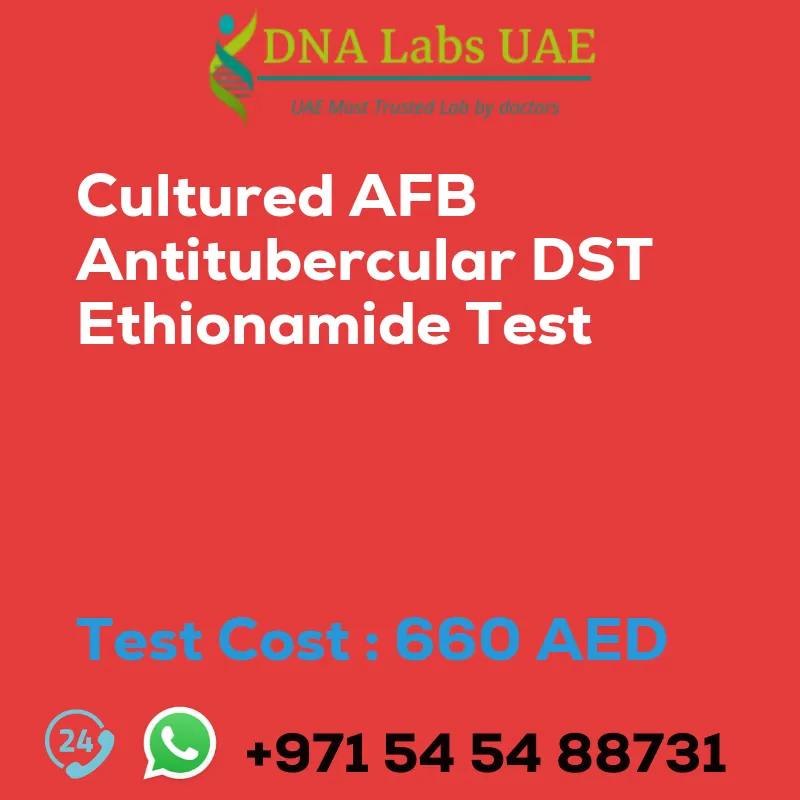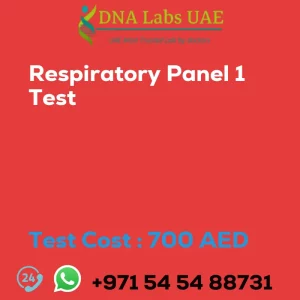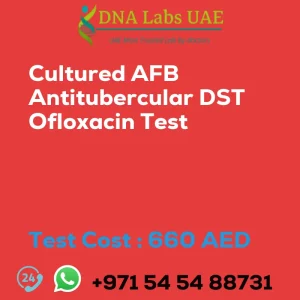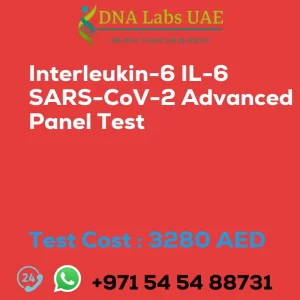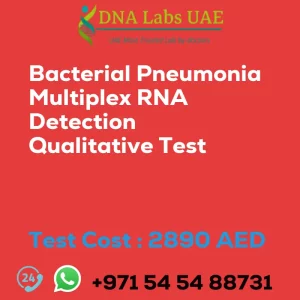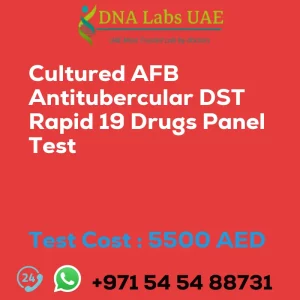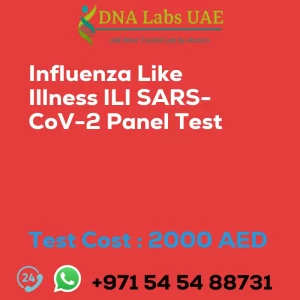CULTURED AFB ANTITUBERCULAR DST ETHIONAMIDE Test
At DNA Labs UAE, we offer the CULTURED AFB ANTITUBERCULAR DST ETHIONAMIDE test at a cost of AED 660.0. This test is used to determine the susceptibility of Mycobacterium tuberculosis to the drug ethionamide.
Test Components and Price
Test Name: CULTURED AFB ANTITUBERCULAR DST ETHIONAMIDE Test
Price: 660.0 AED
Sample Condition
Submit a pure growth of Mycobacterium tuberculosis complex on appropriate media in a sterile screw-capped container in a sealed plastic bag. Ship refrigerated or, when used with other AFB culture or Mycobacteria identification tests, the pure growth obtained in the Laboratory from specimens already submitted will be processed for Antitubercular Sensitivity.
Report Delivery
Sample: Daily by 3.30 pm
Report: 21 days
Method
Automated Fluorescent
Test Type
Tuberculosis
Doctor
Physician
Test Department
Pre Test Information: No special preparation required
Test Details
The Cultured AFB Antitubercular DST (Drug Susceptibility Testing) for Ethionamide is a laboratory test used to determine the susceptibility of Mycobacterium tuberculosis to the drug ethionamide. Ethionamide is an antibiotic used in the treatment of tuberculosis (TB) and is part of the second-line drug regimen for drug-resistant TB.
The test involves culturing the Mycobacterium tuberculosis bacteria obtained from a patient’s sputum or other clinical samples. The cultured bacteria are then exposed to different concentrations of ethionamide to determine the minimum inhibitory concentration (MIC) required to inhibit their growth. The MIC is the lowest concentration of the drug that prevents visible growth of the bacteria.
The results of the Cultured AFB Antitubercular DST for Ethionamide will determine whether the strain of Mycobacterium tuberculosis is susceptible or resistant to ethionamide. Susceptible strains will be inhibited by the drug at clinically achievable concentrations, indicating that ethionamide can be used effectively in the treatment of the patient’s TB. On the other hand, resistant strains will continue to grow even at high concentrations of ethionamide, indicating that alternative drugs or drug combinations need to be used for effective treatment.
This test is important in guiding the selection of appropriate drugs for the treatment of TB, especially in cases of drug-resistant strains. It helps in determining the most effective drug regimen to ensure successful treatment outcomes and prevent the development of further drug resistance.
| Test Name | CULTURED AFB ANTITUBERCULAR DST ETHIONAMIDE Test |
|---|---|
| Components | |
| Price | 660.0 AED |
| Sample Condition | Submit pure growth ofMycobacterium tuberculosis complexon appropriate media in sterile screw capped container in a sealed plastic bag. Ship refrigerated ORwhen used with other AFB culture or Mycobacteria identification tests, the pure growth obtained in the Laboratory from specimens already submittedwill be processed for Antitubercular Sensitivity. |
| Report Delivery | Sample Daily by 3.30 pm; Report 21 days |
| Method | Automated Fluorescent |
| Test type | Tuberculosis |
| Doctor | Physician |
| Test Department: | |
| Pre Test Information | No special preparation required |
| Test Details |
The Cultured AFB Antitubercular DST (Drug Susceptibility Testing) for Ethionamide is a laboratory test used to determine the susceptibility of Mycobacterium tuberculosis to the drug ethionamide. Ethionamide is an antibiotic used in the treatment of tuberculosis (TB) and is part of the second-line drug regimen for drug-resistant TB. The test involves culturing the Mycobacterium tuberculosis bacteria obtained from a patient’s sputum or other clinical samples. The cultured bacteria are then exposed to different concentrations of ethionamide to determine the minimum inhibitory concentration (MIC) required to inhibit their growth. The MIC is the lowest concentration of the drug that prevents visible growth of the bacteria. The results of the Cultured AFB Antitubercular DST for Ethionamide will determine whether the strain of Mycobacterium tuberculosis is susceptible or resistant to ethionamide. Susceptible strains will be inhibited by the drug at clinically achievable concentrations, indicating that ethionamide can be used effectively in the treatment of the patient’s TB. On the other hand, resistant strains will continue to grow even at high concentrations of ethionamide, indicating that alternative drugs or drug combinations need to be used for effective treatment. This test is important in guiding the selection of appropriate drugs for the treatment of TB, especially in cases of drug-resistant strains. It helps in determining the most effective drug regimen to ensure successful treatment outcomes and prevent the development of further drug resistance. |

